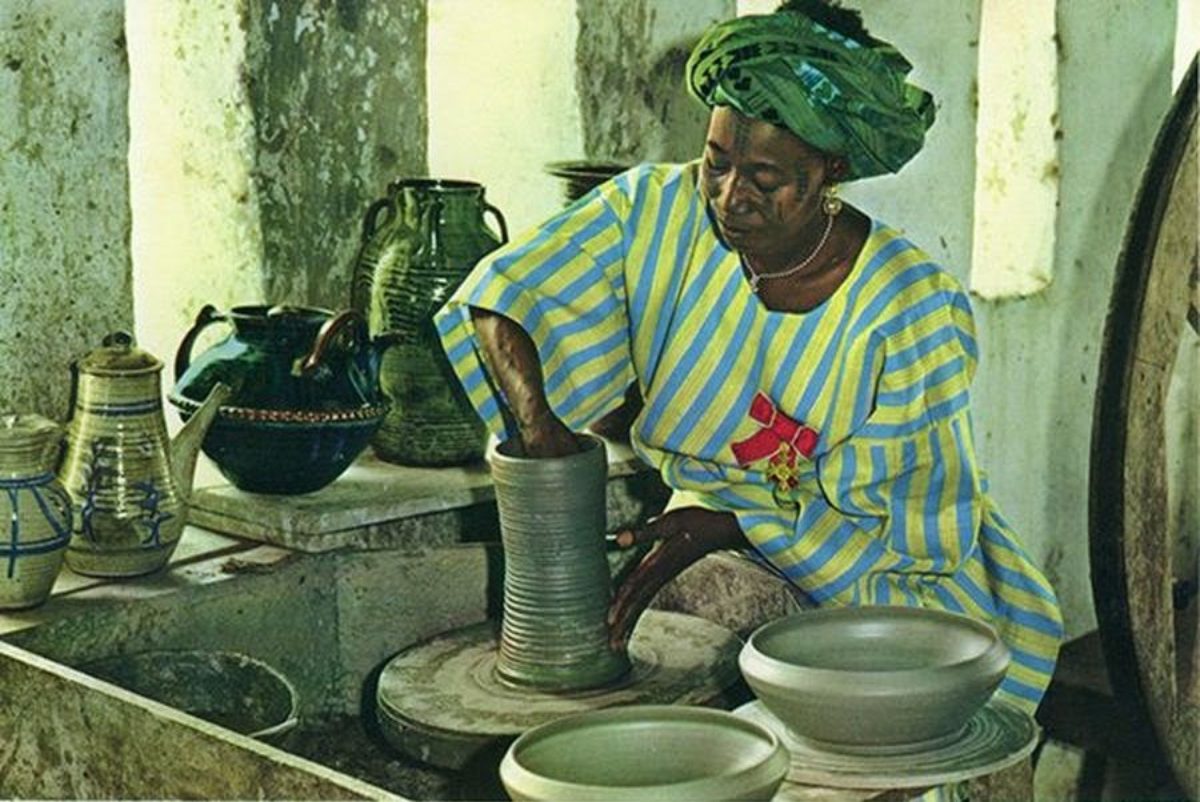At the time Alhaji Sulaimanu Barau OBE became the 6th Emir of Abuja, now Suleja, in 1944, he was the first emir in the entire Northern Nigeria with the privilege of acquiring Western education. His educational background ensured a modern approach to the traditional method of governance with the encouragement of not only boys, but girls and adult education in the Abuja Native Authority. In one of his frequent tours to districts of his Emirate, he encountered the beautiful pots made by a very young Gwari woman, Ladi, in Kwali, the present Kwali Area Council of the Federal Capital Territory. Ladi learnt the art of pottery as a child from her aunt, using the traditional method of coiling.
At a very young age, Ladi Kwali made large cooking pots, bowls and flasks from coils of clay, beaten from inside with a flat wooden paddle. They were decorated with incised geometric and stylised figurative patterns, including scorpions, lizards, crocodiles, chameleons, snakes, birds and fish. Her pots were noted for their beauty of form and decoration, and she was recognised regionally as a gifted and eminent potter. Her wares were sold even before being taken to the market. Several were acquired by the Emir.
Hadiza Ladi Kwali was born in 1925. She grew up and excelled, right from an early age, in a family that kept up with the folkloric female tradition of pottery making. The histories of Michael Cardew, Ladi Kwali and the Abuja Pottery Center, now in Suleja, were interwoven. One of them will not be complete without mentioning how it was influenced by the other two.
The British colonial government depended on export to its colonies in the West African sub-region for the supply of commodities, but at the beginning of the 2nd World War, enemy shipping made this almost impossible. The colonial government subsequently adopted a policy of developing indigenous industries. Although previous attempts elsewhere were not successful, in 1951 Mr Michael Cardew, a famous English Studio Potter was appointed by the Nigerian colonial government and given a free hand to choose where to establish a home-grown industry to meet the middle-class Nigerian demand for glazed tableware suitable for European-style meals and drinks.
- 25 agencies, ministries to spend N85bn on vehicles in 2024
- Plateau: JNI calls for concerted efforts to end killings
It was not only the beautiful and passionate pottery tradition that influenced Mr Cardew’s choice of Abuja, but also his encounter with the collections of Ladi Kwali shown to him by Sulaimanu Barau, the emir at his home in 1951. In essence, Ladi Kwali’s products played a major part in influencing the decision. “Yes, hurray!!! Abuja was the place for inspiration and that would make for good pots”. That was his statement in the report.
Ladi Kwali joined the Abuja Pottery Training Center in 1954. Mr Cardew always acknowledged that her basic skills and genius were fully developed without formal education before then. Despite the fact that there were always more men than women working with Cardew, it turned out that the Abuja Pottery Training Center’s star potter was Ladi Kwali, a woman. While he introduced wheels and kilns to the centre, he also learnt about traditional firing methods and ornamentation from her.
Her ornamentation skills became more sophisticated over the years, her fame blossomed in the world of pottery beyond the shores of the land. Her pots were featured in international exhibitions of Abuja pottery organized by Cardew, and in Europe in 1958, 1959, and 1962. Her work was displayed during Nigeria’s independence celebrations in 1960. In 1961, she gave demonstrations at the Royal College, Farnham, and Wenford Bridge in Great Britain, and she also gave demonstrations in France, Germany and Canada over this period.
In 1972, she toured America with Cardew. Her work was shown to great acclaim in London at the Berkeley Galleries. She attended the world exhibition on pottery in Italy, CONEX 1981, where she was rated one of the best potters in the world. Despite her inability to speak the English language, but as an excellent demonstrator, she was able to effectively deliver lectures through interpreters at home and in many European and American universities and institutes as a guest lecturer, on how she improved her traditional pot-making skills to world standard.
The Abuja Pottery Center in Suleja, where she worked and made history was named after her, ‘Ladi Kwali Pottery Center’ in 1980. The same year, the Nigerian Government invested in Kwali the insignia of the Nigerian National Order of Merit Award (NNOM), the highest national honour for academic achievement. She was a recipient of the merit awards of the OBE, and OON and an Honorary Doctorate Degree of Letters from the Ahmadu Bello University, Zaria. Her picture appears on the back of the Nigerian N20 Naira note. Dr. Ladi Kwali died in 1984.

 Join Daily Trust WhatsApp Community For Quick Access To News and Happenings Around You.
Join Daily Trust WhatsApp Community For Quick Access To News and Happenings Around You.